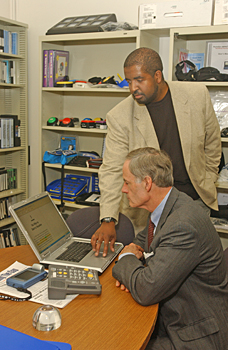
Carper's visit followed an announcement by UD President David P. Roselle earlier this year that the Delaware Assistive Technology Initiative (DATI) at the University of Delaware was the recipient of a three-year, $600,000 grant from the U.S. Department of Education's Rehabilitation Services Administration to improve access to assistive devices by Delawareans with disabilities.
Assistive technology includes any device that helps people with disabilities complete various tasks, from canes, walkers and special chairs to unique hardware and software for computers.
“We heard about a similar initiative in New Jersey,” Carper said. “We are looking for ways to turn the used technology around, and we want to let the people in Washington, D.C., know about the things that DATI is up to.”
DATI, a consortium encompassing 19 state agencies and organizations serving people with disabilities, was established in 1991 to help improve access to assistive technology for Delawareans. Among its services, DATI operates operates assistive technology resource centers in each county to provide equipment demonstrations and short-term loans of equipment for trial use periods at no cost.
Two new loan programs are in the works that would allow Delawareans to borrow money to purchase assistive technology, including a program that would guarantee loans for individuals who would not ordinarily qualify for traditional bank loans.
“We are about to open a new loan program where people can borrow money to purchase assistive technology and pay back the amount over a period of time,” Beth Mineo Mollica, DATI director, said. “Our assistive technology resources centers help people find devices that will let them learn and work and play and live more safely in their communities.”
Individuals can visit the resources center and learn about the tools available and take them to their school, home or workplace to try them out, Mollica said.
“Not all technology is high-tech. A small or simple device can also make a big difference,” Mollica said. “A lot of this depends on the person using the device and what their financial resources are.”
During the tour, Carper was given a demonstration of several assistive devices by Marvin Williams, an assistive technology specialist at the center.
Assistive devices on display included Kurzweil 3000 comprehensive reading, writing and learning software that converts scanned text to audio files. Also on display were a dome magnifier that looks like a king-sized paperweight, a Beamer TV-video phone and an Ameriphone P3000 picture phone. Low-tech devices included a slant board to facilitate reading and writing, as well as a pair of “reachers” that make it easier for users reach and grasp certain objects.
“If people need something, they come to me, and I reach into my bag of tricks and find something for them,” Williams said. “The Kurzweil software lets people with visual impairments hear what is in the book. They don't have to miss out on the things they used to enjoy.”
Recognizing how much equipment was out there but not being used, in 1993 DATI launched an assistive technology exchange program that enables individuals to buy, sell or give away used devices through "want ads." At that time, those having devices and those looking for devices called a central number to place their listings, which were then published quarterly in The AT Messenger, the DATI's newsletter. With the launch of the DATI's multi-featured web site [www.dati.org] in March 2004, the service became automated, making it much more interactive and efficient.
DATI also operates an assistive technology exchange online want ads web site at [www.dati.org/v3/index.php] that puts people with technology they no longer need in touch with those seeking such technology.
Mollica said that she hoped Carper's visit would help spread the word out about DATI and let First State residents know about the services available at the resource centers.
“We want to get everybody, including state agencies, involved,” Mollica said. “We also would like to get large corporations to donate technology they would ordinarily discard when they move up to a newer level. DATI is a way to keep things out of the landfill and get them to the people who need them.”
Article by Jerry Rhodes
Photo by Duane Perry


